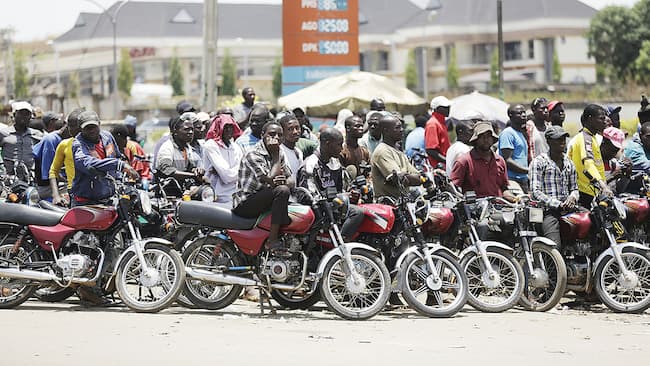Nigerians spent about N304.23 billion importing motorcycles, popularly called Okada, and tricycles into the country within a nine-month period covering January to September 2020.
Some of these motorcycles and tricycles were imported as Completely Knocked Down parts that are assembled by manufacturers in Nigeria, based on analyses of the foreign trade statistics obtained from the National Bureau of Statistics, NBS.
Compared to the same period in 2019, checks showed that there had been 6.37 percent decline in the value of the imported motorcycles and tricycles amid a ban on major roads in Nigeria’s largest commercial city, Lagos.
According to NBS data, Nigerians spent N324.94billion on the importation of motorcycles and tricycles between January to September 2019.
READ ALSO: FG May Reintroduce Tollgates As 12 Highways Are Set For Concession
Checks showed that most of the motorcycles and tricycles had between 50 to 250 cylinder capacity.
The motorcycles and tricycles were mostly imported into Nigeria from the Asian countries such as India, China, Indonesia and Japan and form one of Nigeria’s top 10 imported goods.
A further analysis of the trade statistics showed that in the first quarter of 2020, Nigerians imported motorcycles and tricycles worth N138.9billion.
A breakdown of the N148.28billion showed that motorcycles and tricycles worth N93.97billion were imported from the India, N44.82billion from China, N114.4 million from Indonesia and N0.63million from Japan.
In the second quarter of 2020, the NBS statistics put the importation of motorcycles and tricycles at N92. 09billion.
An analysis of the countries of origin showed that the India accounted for N66.6billion worth of imported motorcycles and tricycles, China N25.4billion and Indonesia N151.9million.
In the third quarter of 2020, the report put the monetary value of the vehicles imported into the country at N73.24billion.
About N50.71billion worth of motorcycles and tricycles were shipped in from India, N22.45billion of the transport cycles from China and N80.89 million from Indonesia.
Motorcycles and tricycles have formed an important means of commercial transportation and a major source of livelihood for Nigeria’s lower class in Nigeria.
Trade in these means of transport through a hired purchase agreement in which transporters pay for the motorcycles and tricycles in instalments is common within the country.
They are the most preferred means of transport by commuters in Nigeria’s busy commercial centres where the roads are full of endless traffic.
The NBS data indicated that in Q1 2019, motorcycles and tricycles worth N95.35bn were imported, N111.96bn in Q2 and N117.63bn in Q3 of the same year.
They could easily manoeuvre through the traffic and this attribute became one of the high selling points for start-ups that ventured into ride hailing business using motorcylces in Lagos and othe business commercial centres.
However, the Lagos state government, in January 2020, announced a restriction on okada and tricycles, including bike hailing services.
Out of 20 local government areas in the state, the ban affected six: Surulere, Lagos Mainland, Lagos Island, Ikeja, Eti Osa and Apapa.
The government said its decision to banned them was due to rising accidents and deaths caused by motorcyclists.
READ ALSO: FRSC To Introduce Digital Driver’s Licence
The Permanent Secretary at the Lagos State Ministry of Transportation, Dr Taiwo Salaam, said motorcycles killed over 11,000 people in the state between 2011 and 2019.
The Lagos Commissioner for Transport, Dr Frederic Oladeinde, added that at least 600 deaths between 2018 and 2019 were linked to motorcycles.
“Lagos is a megacity. You don’t build a megacity on two-wheelers and tricycles. It had never been part of our planned strategic master plan for Lagos,” Oladeinde had said.
This move affected bike hailing services such has MAX, Gokada and OPay which had each raised significant funding from international investors totaling $183.4 million.













